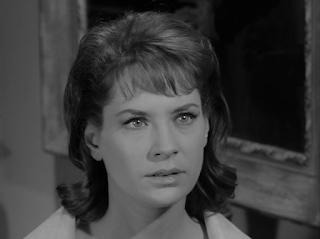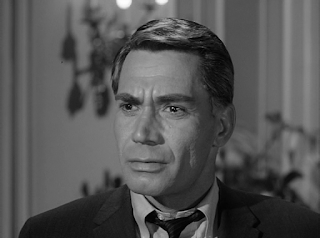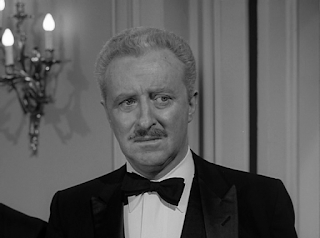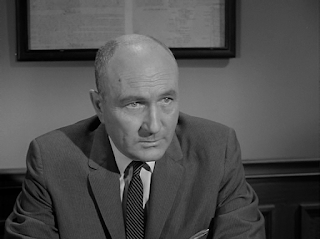by Jack Seabrook
After his teleplay for "The Lonely Hours," a domestic drama involving mothers and babies that features an all-female cast, William D. Gordon co-wrote the teleplay for "The Long Silence," another domestic drama where the main characters were all women and where the central figure was confined to her home and unable to speak. His next teleplay for The Alfred Hitchcock Hour was "The Dark Pool," whose teleplay is credited to Gordon and Alec Coppel, based on a story by Coppel. I have been unable to find any published story that could have served as the basis for this episode, so it is reasonable to assume that the "story" was either a story idea or an original teleplay by Coppel that was revised by Gordon.
Coppel was also credited as the author of the story on which the 1957 episode of Alfred Hitchcock Presents called "The Diplomatic Corpse" was based; like that earlier half-hour, "The Dark Pool" is set in Southern California and features Mexican and Anglo characters.
 |
| Lois Nettleton as Diane Castillejo |
This episode opens with a tragic scene, where Diane Castillejo, a wealthy young woman, returns from horseback riding to find her toddler son, Victor, in his playpen, which has been placed next to the family's large swimming pool. The child is being watched by his nanny, an older woman named Andrina Gibbs (known as Nanny); a servant named Pedro Sanchez stands nearby, cleaning the pool. Diane asks Pedro to fix her a vodka tonic and, after Pedro and Nanny exchange worried looks, Diane amends her request by telling her servant to "'make it a light one.'" Pedro brings Diane the drink and he and Nanny both leave Diane alone with her son. The telephone rings inside the house and Diane goes to answer it, drink in hand, leaving the child unattended. Suspense is created right away as the viewer wonders if this choice will be a bad one.
 |
| Anthony George as Victor Castillejo |
Diane answers the phone and speaks to her husband, Victor, who is calling from the back seat of a car in nearby San Diego. He is with Larry Hawthorn, an attorney, and he has just returned from a business trip. After hanging up, Victor tells Larry that Diane has not had a drink since they adopted the baby. Diane goes back outside and sees the playpen empty--the implication is that the baby climbed out of the playpen, fell in the pool, and drowned.
Suspense is created by alternating shots between Diane talking to her husband and the baby bouncing in his playpen. Diane tells the first of a series of lies when she assures her husband that she no longer drinks, even while she is holding a drink in her hand. The first scene thus establishes that Diane is an alcoholic and that her son's death may be a consequence of her addiction, though she appears not to be drunk, just careless. Why was the playpen positioned right next to the pool? Why did Diane suddenly want a drink, and why did Pedro and Nanny allow her to have it and leave her alone with the baby if they both knew that she was an alcoholic who had promised to stop drinking and who had not had a drink since adopting the baby? These questions are never answered.
 |
| Madlyn Rhue as Consuela Sandino |
The coroner holds an inquest regarding the baby's death and the lies begin to multiply as Nanny testifies that she, not Diane, left the baby alone. Larry says that the telephone call lasted only a minute and the coroner rules that the death was accidental. It seems that Nanny had cared for Diane as a child and continues to protect her. At home, Victor asks Diane to dismiss Nanny, but when Diane goes upstairs she finds Nanny packing her suitcase, having anticipated Victor's decision. Nanny dissuades Diane from telling Victor the truth about the accident, reminding her that she promised to stop drinking and convincing her that admitting the truth to Victor would make him doubt her from then on. Nanny suggests that the tragedy of the child's death will help Diane quit drinking, foolishly thinking that Diane can conquer her addiction through willpower and encouraging her to continue the pattern of deception.
After Nanny departs, a young woman named Consuela Sandino arrives at Diane's home, claiming to be the child's birth mother. She knows the truth about the accident and, when Victor returns home, she tells him that she and Diane are old friends and that Diane has asked her to stay for the weekend. She later tells Diane that Pedro told her about the accident and about Diane's promise not to drink, so when Diane again resolves to tell her husband the truth, Consuela and Pedro point out the pitfalls (as Nanny did) and Diane offers to pay Consuela for her silence. Pedro later suggests to Consuela that they take the money and leave, yet she has her sights set on a bigger prize, hoping to replace Diane as Victor's wife.
 |
| David White as Larry Hawthorn |
Soon, Victor arrives home to find Diane drinking at the bar. She expresses remorse and assures him that she can control herself; he is leaving on another business trip and tells Diane that he has asked Consuela to stay with her, believing that the women are old friends and that Consuela's presence will be beneficial. Victor's judgment is poor--he leaves his alcoholic wife at home after she has been drinking and while she is still reeling from a tragic loss.
Diane wakes at night to the sound of a baby crying. Unable to find the source of the noise, she is distraught. The next day, she is drinking again; the next night, the crying returns and we see that Pedro and Consuela are torturing Diane by using a hidden tape player. Diane turns to alcohol again to self-medicate and Victor returns from his trip early to find that his wife has been drinking to excess. She begs her husband not to leave again and insists that she heard a baby crying. The incidents with the tape player are not resolved later in the episode and neither Victor nor Diane ever discover what was causing her to hear a baby cry. Perhaps it would have worked better to leave the baby's cries unexplained, as if they came from Diane's tortured imagination.
 |
| Eugene Iglesias as Pedro Sanchez |
Victor demonstrates his complete lack of understanding of his wife's condition when he announces that he plans to have a dinner party to host a senator and several other guests. He understands that Diane is able to control her drinking when he is at home, but his work constantly pulls him away, so he suggests that she see a psychiatrist. Diane sees Consuela approach Victor by the pool and fears that they may become intimate, so she immediately takes a drink. That evening's dinner party is a disaster, as Diane gets very drunk and makes a scene before breaking down and apologizing. The next day, Victor attempts to talk his wife into spending a few weeks at a sanitarium, but she insists on trying to conquer her problems at home, without help. An alcoholic who drinks to steady her nerves and bury her fears, Diane is unlikely to succeed.
Diane visits the orphanage where she adopted the baby and speaks to Sister Marie Therese, asking if she can adopt another baby right away. Apparently, Diane thinks that replacing her dead child will help improve her mood and aid in controlling her urge to drink. Fortunately, the nun tells her that a long period of investigation is necessary before an adoption can be carried out but, after Diane confesses to the nun about her lie regarding the accident, Sister Marie Therese reveals to Diane that the baby's mother died in childbirth, so Consuela cannot be the boy's birth mother. Diane now realizes that Consuela is a liar as well as a blackmailer, so she is finally ready to tell her husband the truth. This suggests that her reticence up to this point was in part due to sympathy and guilt regarding Consuela's alleged loss. Diane's motives for deceiving her husband and others are complex.
 |
| Doris Lloyd as Nanny Gibbs |
Back at home, Diane "gathers the suspects," as in a murder mystery, summoning Consuela and Pedro to a confrontation for Victor's benefit. She tells Victor the truth about her part in the baby's death and Pedro turns on Consuela, despite her urging him to lie about how many drinks Diane had had before her son died. Pedro chooses the path of honesty over the wishes of Consuela, who is revealed to be the true villain of the piece. Victor sends the duo away immediately and Diane tells him that she will now consent to going to a sanitarium. She finally takes responsibility for her actions and, though she tells Victor to get a divorce, he confesses his own shame and understands that it was he who caused her to fear telling him what really happened. The mystery is solved and the lovers are reunited, set free by the truth, at least for the moment.
"The Dark Pool" is neither a condensed novel not an expanded short story and, perhaps because of that, it seems to be just the right length. The show is well paced and flows quickly from beginning to end, with a generous use of close ups to help display the characters' emotions. The "dark pool" of the title refers more to Diane's inner turmoil than to the actual swimming pool in which the baby drowns, which is bathed in sunlight.
 |
| John Zaremba as the coroner |
The show is directed by Jack Smight (1925-2003), whose four episodes of The Alfred Hitchcock Hour all deal with women and domestic problems. This was his last episode for the series and all of the shows he directed aired in 1963. The prior one was "The Lonely Hours," which was also written by William D. Gordon. Smight directed for television from 1949 to 1986 and for film from 1964 to 1989. Among his many films were Harper (1966) and Midway (1976); he also directed four episodes of The Twilight Zone and won an Emmy for directing in 1959.
Alec Coppel (1907-1972), who is credited with the story and co-credited with the teleplay, was born in Melbourne, Australia, in 1907. He moved to England in 1927 and his first play was produced in 1935. In 1937, he had a hit on the London stage with I Killed the Count, which was later adapted for the only multi-episode story of Alfred Hitchcock Presents, airing over a three-week span in March 1957. The play had been performed in the U.S. on Broadway in 1942, though Coppel returned to Australia during WWII. He continued to write plays, as well as novels and screenplays. Moving to Hollywood in 1954, Coppel wrote teleplays and screenplays, including some uncredited rewrites on Hitchcock's To Catch a Thief (1954), and he worked closely with Hitchcock on the script for Vertigo (1958). Coppel continued to write novels, screenplays, teleplays, stage plays, and radio plays for another 15 years until his death in 1972.
 |
| Isobel Elsom as Sister Marie Therese |
Starring as Diane is Lois Nettleton (1927-2008), who was Miss Chicago in 1948 and who went on that year to be a semi-finalist in the Miss America pageant. She trained at the Actors Studio and began acting on radio that same year and on Broadway the next year; her film and TV career lasted from 1957 to 2006. This was the only Hitchcock TV show in which she appeared; she was also seen on The Twilight Zone and Night Gallery.
Anthony George (1921-2005) receives second billing as her husband, Victor. Born Ottavio Gabriel George, he served in WWII and was in films from 1950 to 1957 and on TV from 1951 to 1988. He was a semi-regular on Dark Shadows in 1967, on Search for Tomorrow (1970-1975), and on One Life to Live (1978-1984). He also appeared in one episode of Alfred Hitchcock Presents, "Flight to the East."
Consuela is played by Madlyn Rhue (1935-2003), who was born Madeline Roche and who took her stage name from the film, 13 Rue Madeleine (1947). She was a dancer at New York's Copacabana night club when she was just 17 years old and her film and TV career lasted from 1958 to 1996. Rhue was seen on Star Trek and The Night Stalker and she was a regular on Days of Our Lives from 1982 to 1984. This was the only time she appeared on the Hitchcock show.
In smaller roles:
- David White (1916-1990) as Larry Hawthorn, the lawyer in the back of the car with Victor; he was a Marine in WWII and appeared on Broadway starting in 1949. He was on screen from 1949 to 1989 and appeared in many television shows. He was in four episodes of the Hitchcock series (including "Dry Run") and two of The Twilight Zone, but he is best remembered for his supporting role as Larry Tate on Bewitched (1964-1972).
- Eugene Iglesias (1926- ) as Pedro Sanchez; born Eugene Iglesias Carrillo in Puerto Rico, he was on screen from 1951 to 1970.
- Doris Lloyd (1891-1968) as Andrina "Nanny" Gibbs; born in Liverpool, she started out in Vaudeville in 1916 and appeared in over 150 films from 1920 to 1967, including Phantom Lady (1944). She was in four episodes of Thriller and nine episodes of the Hitchcock show, including "The Schartz-Metterklume Method," where she also played a character called "Nanny."
- John Zaremba (1908-1986) as the coroner; he started out as a journalist at the Chicago Tribune before becoming an actor. He was in movies from 1950 and on TV from 1954, including regular roles on I Led Three Lives (1953-1956) and The Time Tunnel (1966-1967). He appeared on The Twilight Zone and Batman and he was on the Hitchcock show eleven times, including "The Kind Waitress."
- Isobel Elsom (1893-1981) as Sister Marie Therese; born Isobel Reed in England, she was a veteran of stage, film, and TV who appeared onscreen from 1915 to 1964, including roles in 1947 in Chaplin's Monsieur Verdoux and Hitchcock's The Paradine Case. She was on TV from 1950 to 1965 and appeared five times on the Hitchcock show, including "Back for Christmas" and "Final Vow," where she also plays a nun.
- Walter Woolf King (1899-1984) as Senator Hayes; he started out on Broadway in 1919, worked in radio, and was seen in many movies and TV shows from 1930 to 1977, including A Night at the Opera (1935), Swiss Miss (1938), and Go West (1940). He was in five episodes of the Hitchcock series, including "Our Cook's a Treasure."
 |
| Walter Woolf King |
- Eva Novak (1898-1988) as Mrs. Hayes, the senator's wife; she was on screen from 1917 to 1966 and played Tom Mix's love interest in ten westerns. Many of her later roles were uncredited.
 |
| Eva Novak |
- Bess Flowers (1898-1984) as Mrs. Pradanos, a guest at the ill-fated dinner party; nicknamed the Queen of the Extras, she played hundreds of uncredited parts on screen from 1923 to 1964, including bit parts in seven films directed by Hitchcock and small roles in six episodes of the Hitchcock TV show.
 |
| Bess Flowers |
- Paul Bradley (1901-1999) as Emilio Pradanos, her husband; he was a stand-in for George Sanders and he also appeared in many films in uncredited roles. His screen career lasted from 1935 to 1990 and he appeared on The Twilight Zone, Thriller, Batman, and six episodes of the Hitchcock TV show.
 |
| Paul Bradley |
"The Dark Pool" aired on CBS on Friday, May 3, 1963; watch it for free online here.
Sources:
Grams, Martin, and Patrik Wikstrom. The Alfred Hitchcock Presents Companion. OTR Pub., 2001.
IMDb, IMDb.com, https://www.imdb.com/.
"The Dark Pool." The Alfred Hitchcock Hour, season 8, episode 29, CBS, 3 May. 1963.
Wikipedia, Wikimedia Foundation, https://www.wikipedia.org/.

No comments:
Post a Comment